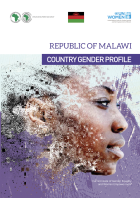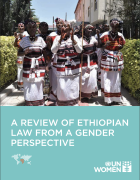1 - 11 of 11 Results
Date:
The ultimate goal is that women and girls in Sudan benefit from gender-responsive humanitarian action and targeted assistance that responds to their basic needs, and from opportunities for their meaningful participation in peace, political and humanitarian processes.
Date:
The Malawi Counrty Gender Profile publication presents a review of existing gender issues identified through a review of documents and reports recently released. The generic purpose of Country Gender Profile is to strengthen national understanding and data on the advancement of international, regional and national commitments towards Gender Equality and Women's Empowerment.
Date:
Devolution has increased opportunities for women and other marginalized groups to participate and engage in county-level planning, budgeting, and implementation, and ensured an opportunity for county governments to integrate gender-responsive mechanisms in these same processes. The report synthesizes the impact on women and girls in devolved sectors of local government including education, health, agriculture, water and sanitation, and urban planning across the 14 counties of the United Nations Joint Devolution Programme.
Date:
The assessment offers a series of measures for re forming Ethiopian law to ensure that laws are gender sensitive and more effective at ensuring gender equal ity and non-discrimination. Most notable is that a total of 5 laws or provisions must be repealed in whole or in part; 26 laws must be revised or amended and two (2) new laws must be enacted to bring Ethiopia’s legislative framework in line with its regional and international obligations on gender equality and women’s empowerment. The report also emphasizes the need to prioritize the implementation of national laws that comply with gender equality standards, and in this context, recommends one policy measure to ensure that laws fully deliver on women’s rights
Date:
This publication highlights findings from the Zanzibar SDGs Gender Indicators Study in the form of infographics. The infographics showcase findings from each of the sectors covered in the report namely: Poverty and Hunger, Health, Decent Work, Quality Education, Gender Equality, Key Messages and the COVID-19 Context, and Recommendations.
Date:
This New Generation of the NAP on WPS focuses on five pillars for implementation (1) Prevention, (2) Protection, (3) Participation, (4) Relief and Recovery (5) Coordination and Accountability.
Date:
UN Women, with the support of the government of Finland and the participating countries, launched the project on “Women’s Land Rights and Tenure Security in the Context of the SDGs” in 2016. The project is currently implemented in Ethiopia, Kenya and Tanzania with the aim of upscaling in the three countries and expanding to more countries.
Date:
Hygiene and sanitation are development issues that have long been overlooked by governments. However, as a result of sustained advocacy efforts, they are at the very top of the global and national agenda today. Senegal has a fairly progressive national strategy that aims to improve gender parity in political representation, healthcare and education, access to drinking water and sanitation facilities and maternal and infant mortality among other priorities.
Date:
This edition addresses the Health issues of Women in Malawi and Senegal, Education in Burkina Faso and in Africa, Peace and Security in Cameroon and at African Union, Women in Agriculture in Mozambique and Ethiopia and Women Economque Empowerment across Africa.
Date:
Guided by the Continental Policy Framework on Sexual and Reproductive Health and Rights and its Maputo Plan of Action, African countries have made significant strides in the fight to reduce preventable maternal and child deaths over the past decade. Despite commendable achievements, challenges still continue to hinder progress at the required rates of change. Africa remains a highly risky region for women to become pregnant and give birth; women in Africa, still face a 1 in 39 lifetime risk of...
Date:
Hygiene and sanitation are development issues that have long been overlooked by governments. However, as a result of sustained advocacy efforts, they are at the very top of the global and national agenda today. Senegal has a fairly progressive national strategy that aims to improve gender parity in political representation, healthcare and education, access to drinking water and sanitation facilities and maternal and infant mortality among other priorities.











